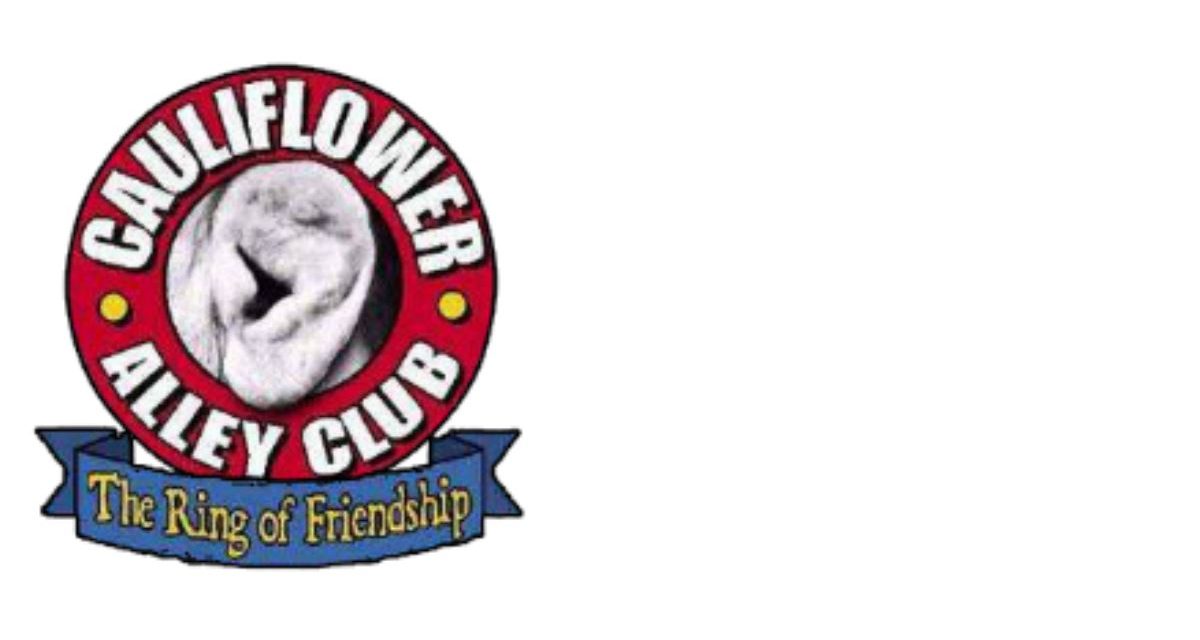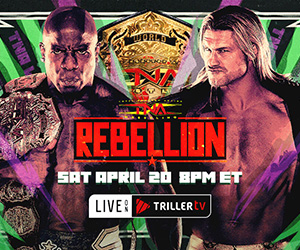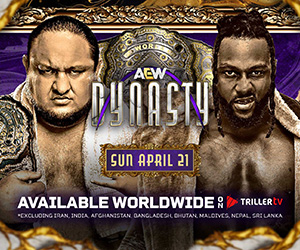LAS VEGAS — It may have been Harley Race’s night, receiving the top honour in pro wrestling and all, but it was his old partner Larry “The Axe” Hennig who really went over Saturday night.
Race was given the Iron Mike Mazurki award for his accomplishments during his stellar career at the annual Cauliflower Alley Club (CAC) banquet. He acknowledged that there is nothing that compares to being paid tribute to by one’s peers.
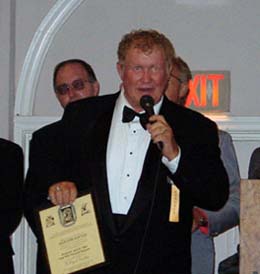
Harley Race receives the Iron Mike Mazurki Award. Photos by Steve Johnson
“I’ve been inducted into several Hall of Fames, but there is no equal to this,” he told a banquet crowd of 400+ at the Plaza Hotel & Casino in downtown Las Vegas Saturday night. (Race is in the Pro Wrestling Hall of Fame, the International Wrestling Hall of Fame, and the WWE Hall of Fame.)
The evening’s co-M.C. Nick Bockwinkel (with J.J. Dillon), introduced Race with a comparison of his own relatively light schedule as AWA World champ to that of NWA World champ Race, who would work 400 dates a year.
Bockwinkel called Race “one of the hardest working, toughest, most rugged S.O.B.s that this profession has ever had.”
“I could cut a promo on probably 90% of the people in this room, but tonight’s not promo time,” Race said. “I just want to say to everybody that my entire life has been professional wrestling.”
He also made reference to the many fans in attendance. “From the absolute bottom of my heart, I thank each one of you, especially the wrestling fans that are here; without them, we would never, ever have went anywhere. Thank you all very much.”
While on stage, Race paid tribute to his many friends in the audience, a few of his students from his Missouri school, his wife B.J., and his AWA tag team championship partner Hennig, whom he called “more like a brother than a friend.”
It was The Axe that provided the biggest laughs of the night, even if much of it was unplanned.
While Art Abrams Lifetime Achievement Award winner Eddie Sharkey’s story was being recounted to the audience, especially his teaming with Rene Goulet against Race and Hennig, The Axe roared out from the crowd, “and we kicked the shit out of them.”
With Lou Thesz Award winner Verne Gagne unable to travel to Las Vegas for health issues, Bockwinkel was forced into impromptu action.
“This is a kicker for me. I have to stand up here and praise Verne Gagne,” Bockwinkel explained with a dramatic pause. “One more job.”
The former AWA World champ then called on Hennig to come on stage and talk about Gagne. It was not exactly a glowing tribute for the former U.S. Olympian who went on to a top-notch pro career, including multiple AWA World title runs, before becoming the promoter for the AWA.
Hennig immediately struck a blow. “Verne Gagne and Jesse Ventura are in Washington leading a gay rights parade,” he joked, continuing the onslaught. “Verne Gagne is the only man who could shake your hand and pick your pocket at the same time. He never had a problem doing that.”
Looking around at the audience, The Axe asked, “How did I get in this spot?”
Just as he seemed to be getting serious, the knife was twisted a little further. “Anyway, I guess Verne’s health isn’t doing too well right now. He had some heart problems, and I found that hard to believe because I never thought he had a heart to start with.”
The Axe did acknowledge Gagne’s role in his own career, and that of his son, “Mr. Perfect” Curt Hennig. “Twenty years, my boy started wrestling, and he still charged me $5,000. What can I say? Anyway, I guess I’ve got to thank Verne in the long way around for getting me started, and I appreciate it. There are a lot of pros and a lot of negatives with him. We never did get along very well, but I guess as I get older, I’m starting to mellow.”
“Mellow” is actually a decent way to describe the entire night in Las Vegas at the annual gathering. It was not a high-flying, spot-fest match of today, but a more strung out, considered, 20-minute Broadway (draw). Honorees were sincere in their appreciation, as they took their framed certificate and Cauliflower Alley Club belt buckle.
The evening started out on a sombre note, with tribute paid to two posthumous honorees, Vivian Vachon and “King of Wrestling” Bobby Shane, and the role call of wrestlers who have died since the last gathering. Recording artist and former wrestler Karl Roach sang “A Wrestler’s Prayer” — written by Len Rossi for his late son Joey Rossi — and then sang an original song about Shane, written by Alfred Ticineto, Jr., who claimed the honour on behalf of Shane’s widow.
Both Paul “Butcher” Vachon and Maurice “Mad Dog” Vachon talked a little about their sister, the youngest of the family, who was killed in 1991, along with her daughter, when struck by a drunk driver.
“All she wanted to do was wrestle,” said The Butcher. “If my sister Vivian Vachon is not in heaven, I don’t want to go.”
Mad Dog talked about how tough his sister was, and introduced his ex-brother-in-law Les “Buddy” Wolff. “If know if there is such a thing, my sister is in Cauliflower Alley heaven.”
Other honorees included:
- Jessica Rogers (Joan Ballard), a woman wrestler from 1958 to 1980, was short with her speech, but promised to return. “I didn’t know this existed, but I tell you I’ll be here every year.”
- Wrestler-turned-actor Scott L. Schwartz, easily one of the tallest men at the dinner, was introduced by fellow grappling thespians Gene LeBell, Rock Riddle and “Wildman” Jack Armstrong. “It’s very breathtaking for me to be up here,” Schwartz said.
- When talking about honouree Scott Casey, Les Thatcher recalled their days as a tag team. “When we became partners, we also become lifelong friends,” Thatcher said, recounting the most famous angle in Casey’s career, where he poured 20 pounds of horse manure onto “Hangman” Bobby Jaggers. But Thatcher also remembered a rib they played on the rookie Casey, where after he streaked through a hotel lobby, his “friends” took off with his clothes. On the podium, Casey said he was “humbled” by the honour, and thanked his mentor Thatcher: “Everything I did besides go to the bathroom, he helped me with.”
- In introducing Dr. Ken Ramey, Tom Andrews recalled how close he came to quitting the business following the in-ring death of Alberto Torres. Distraught over being portrayed in the storyline as the killer of Torres, Andrews was talked into staying around and wearing a mask as the Medics under Ramey’s management. “He was a hell of a referee, he was a good booker and he was a hell of a manager,” said Andrews. As well, Percival Al Friend called Ramey the “Doctor of Friendship.” Ramey credited Lou Thesz and Dory Funk Sr. for much of his success in pro wrestling. “I owe a lot to the business,” he said, thanking, in order, God, his wife and wrestling.

Killer Tim Brooks
- Killer Tim Brooks received his honour with a leather motorcycle jacket on, and his long, gray beard looking as scraggily as ever. “I’ve overdressed,” Brooks deadpanned, explaining that he got his “Killer” nickname by killing towns like Dayton, Cincinnati, Toledo and others. “This means a lot to me, I’m being sincere from the bottom of heart. It really does,” Brooks said. “There are a lot of guys out here that deserve this probably more than I do. Really and truly, I feel like picking one of you and having you come up here and giving this [award] to you. But to hell with you. You’ll get yours next year.”
- Martial Arts honouree Mike Martelle of Kingston, Ontario admitted that he grew up watching pro wrestling, and found inspiration in the great skill of “Mr. Perfect” Curt Hennig, thanking Curt’s father.
- Hamilton’s Pepper Martin, who had a 20-year wrestling and announcing career before getting into acting, was easily the most comfortable of the bunch with the microphone, spinning tales. He pointed out his family, and told his wife Jordy, “If I had a purple heart, I’d give it to her.
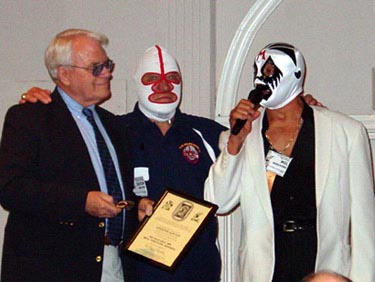
J.J. Dillon, The Destroyer and Mil Mascaras
- The Destroyer Dick Beyer talked about honouree Mil Mascaras, whom he sat with at dinner and found out more about in the previous three hours than he had during the years on the road battling each other in 60-minute matches. “I never knew how paralleled our lives were,” said Beyer. “I didn’t have 12 kids in my family — he was one of 12 kids; I was one of four. He had a black belt, did a lot of amateur wrestling, could have went to Japan in the ’64 Olympics but went into pro wrestling.” Beyer did have a dig at Mascaras’ style: “He was the best competitor that I ever wrestled. He never gave you anything — it’s true — but I didn’t give him anything either. You talk about a shoot or a half-shoot, and that’s the kind of match that it was.” On stage, Mascaras seemed to break out in many grins under his trademark mask. He told about his 42 years in pro wrestling (he was even scheduled to work on Sunday following the banquet) and how he ended up in Los Angeles in 1968. “This is something special,” said Mascaras. “I am really, really, really very, very, very happy. And tonight, really super, super, super happy.” Mascaras also talked about the huge advantage the mask has made in his life, allowing him to remove it and lead a regular life of “terrific privacy.”
- Introduced as a “solid blue-collar worker elevating others” by Les Thatcher, “Wild” Bill White shared some advice for some of the young workers in the crowd, many of whom had participated in the training sessions over the weekend. “You’ve got to do it with your heart and in your mind,” he said. “Do what you want to do, be as proud and be as humble as you can be. But remember, no matter where you go, you’re a professional; act like a professional, be a professional, wrestle like a professional.”
- Art Abrams Lifetime Achievement Award winner Eddie Sharkey talked about the wonderful time he has had in pro wrestling, and how he thinks he really deserves an award for having the most fun in the business. “I’ve had a wonderful time. The friends I’ve made have been just great,” he said. Looking around the room, he asked his old foes Race and Hennig whether they ever thought he’d get such a major award. Both replied in the negative, breaking up the crowd.
- The Future Legend Award was given to Mariko Yoshida of Japan. At 36 years of age, she’s been involved with pro wrestling for 18 years, including a run as CMLL World champion in Mexico and running her own promotion in Japan. Yoshida was very emotional on stage; she started to say thank you in her native Japanese, but broke down crying. Consoled by award presenters Roland Alexander and “Cheerleader” Melissa Anderson (2004 Future Legend), Yoshida gathered her wits about her for a heart-felt “unbelievable” before sitting down.
- CAC vice-president Karl Lauer was also surprised by an honour, which was thanking him for almost 30 years of service to the Club. His wife, Barbara, was also given an award. “Anything I’ve done, it’s because she let me,” Karl joked about his wife.
RELATED LINKS
